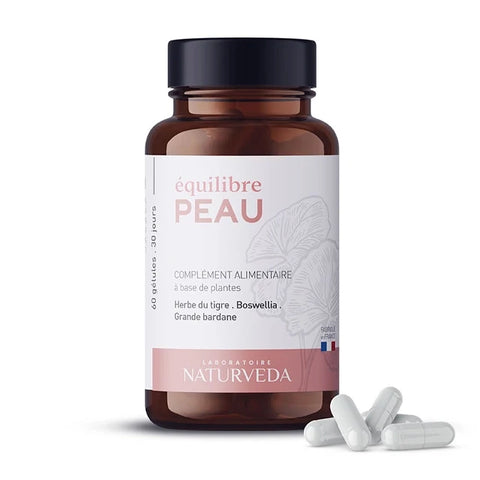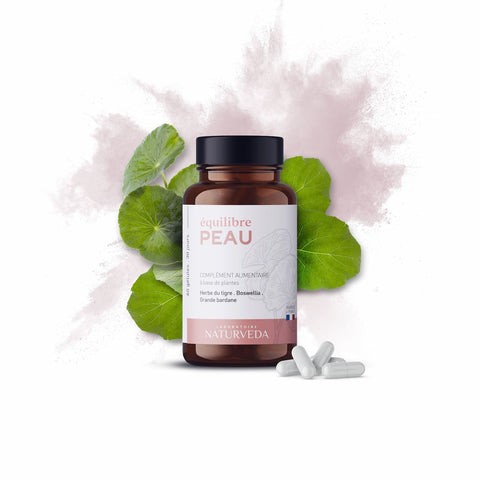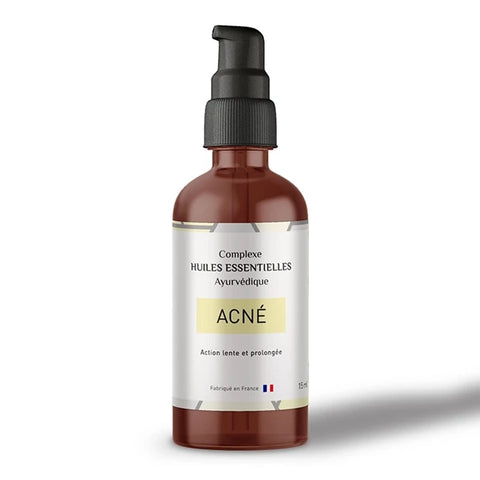7 products
Acne Explained: Pimples, Blackheads and Causes
Commonly recognized as a telltale sign of adolescence, acne is more than just a skin problem. It refers to a skin condition that occurs when hair follicles become clogged with oil and dead skin cells. This is typically characterized by the appearance of pimples, blackheads, and in some more extreme cases, painful cysts.
The manifestation of this condition can range from mild to severe, and untreated acne breakouts often result in unsightly scarring. Although it is most common during adolescence, due to hormonal fluctuations, acne is not exclusive to this age group. In fact, people of all ages can be affected, reflecting its elusive and frustrating nature.
Let's discuss the different types of acne that can affect your skin. We'll mainly distinguish four types: comedonal acne, inflammatory acne, nodular acne, and acne conglobata. These types vary in severity, and each has its own characteristics.
Comedonal acne: Also called non-inflammatory acne, this is the most common type of acne. It is composed primarily of blackheads and whiteheads and tends to concentrate in areas rich in oil glands like the nose, forehead, and chin. Rest assured, while it is an annoying condition, it is usually easy to treat with good skin care and over-the-counter products.
Inflammatory acne: This is characterized by red, inflamed pimples (papules) and pustules that may be tender to the touch. These pimples may be deeper in the skin than comedones, which can make treating them a little more complex.
Nodular acne: This is a more severe type of acne, where the lesions are usually larger and deeper under the skin. Unlike inflammatory acne, nodular acne can be painful and leave scars.
Acne conglobata: This is the most severe form of acne vulgaris, characterized by numerous interconnected nodules. It can be extremely painful and cause irreversible damage to the skin, including severe scarring.
Now that we have a better understanding of the different types of acne, it will be easier to determine the appropriate treatment. Remember, no matter what type of acne you have, it is always best to consult a dermatologist for an accurate diagnosis and an effective treatment plan.
What are the main causes of pimples and blackheads?
Pimples and blackheads that appear on our skin are often the result of many factors. First of all, they are usually a consequence of the accumulation of sebum in the pores of the skin. This sebum accumulates and forms plugs that can gradually become pimples or blackheads.
In addition, some external factors can make the situation worse. For example, stress, poor diet or even certain environmental conditions can contribute to it. Therefore, it is essential to take care of our overall health to prevent the appearance of pimples and blackheads.
Genetics also play a role. If your parents had acne problems, chances are you will too. Finally, hormones can also be a cause. In fact, the increase in androgen hormones can stimulate the production of sebum, which creates an environment conducive to the development of these skin conditions.
However, even though these causes may seem numerous and sometimes complex, remember that many treatments are available to help you manage and effectively treat your pimples and blackheads. The most important thing is to consult a dermatologist who will help you choose the treatment that is best for you, depending on the cause of your pimples.
Are there any aggravating factors for acne?
There are several factors that can make acne worse. First, hormonal fluctuations, especially during puberty and the menstrual cycle, can cause an overproduction of sebum, which can lead to worsening acne.
Then, certain medications, such as corticosteroids, birth control pills, and epilepsy medications, can also make acne worse. Additionally, a diet high in refined carbohydrates and sugar can increase the risk of cancer.
Stress is also an aggravating factor. It can increase the production of sebum and skin cells, which can clog pores and make acne worse. Additionally, smoking can also make acne worse by damaging the skin and clogging pores.
Finally, poor skin hygiene, such as not washing your face regularly or removing makeup before bed, can also make acne worse. Similarly, using non-comedogenic skin care and makeup products can also contribute to worsening acne.
How to prevent the appearance of pimples and blackheads?
First of all, let's get something straight: prevention is easier than cure. In this case, the best way to combat acne and blackheads is to prevent them from appearing.
It starts with a good skincare routine. Daily hygiene helps keep pores healthy and clean. For example, cleansing your skin twice a day with a gentle cleanser can help remove excess oil and dead skin cells. Always make sure to use non-comedogenic products, as they won't clog your pores.
Also, keep in mind that your diet can also play a role in this battle. Foods high in sugar and saturated fat can stimulate sebum production, so consider a balanced diet with plenty of fruits and vegetables. Stress can also make acne worse, so learning how to manage stress can help.
Ultimately, preventing pimples and blackheads is a combination of proper skin care, a healthy diet, and a good mindset. Remember, everyone's skin is unique, so it may be helpful to consult a dermatologist for personalized recommendations.
Can acne be completely eliminated?
Is it really possible to completely eliminate acne? The good news is that the answer is yes. But it’s important to understand that everyone is unique, and the same goes for their skin. What works for one person may not work for another. Finding the right treatment can take some time and patience.
Most people see significant improvement in their acne with a combination of topical treatments, systemic medications, and in some cases, light or laser treatments. Consulting a dermatologist can help discover the best treatment plan for your acne.
But keep in mind: Even after acne has cleared up, it's important to continue taking care of your skin to prevent future breakouts. This can include establishing a skin care routine, avoiding certain foods and other acne triggers, and managing stress.
What are effective treatments for pimples and blackheads?
Nothing is more annoying than the appearance of an unwelcome pimple or blackhead. But don't worry, you're not alone in this struggle. There are several acne treatments available, and thanks to growing research in this area, you can now choose from a wide range of products.
A common term you might come across when selecting an acne treatment product is “benzoyl peroxide.” This ingredient acts as an antiseptic, helping to clear out clogged pores by killing bacteria on the surface of your skin. It can even help minimize redness and reduce swelling.
Another commonly used ingredient is salicylic acid. It works by removing dead skin cells, preventing clogged pores. It is especially effective for treating blackheads and whiteheads.
Speaking of topical treatments, we also have to mention retinoids. These vitamin A derivatives can help reduce inflammation, improve cell turnover, and reduce pore clogging.
In addition to these treatments, some oral medications may also be effective, including antibiotics, oral contraceptives in women, and isotretinoin. However, most of these medications are available only by prescription and should be used with caution.
In addition to conventional treatments, there are also natural alternatives to treat acne. These options are often preferred by those looking to avoid harsh chemicals and take a more eco-friendly and healthy approach to their skin.
A notable example of such natural treatments is the Anti Acne Solution by Naturveda . This solution uses natural plant extracts to effectively combat acne, pimples and blackheads. Not only does it treat the visible symptoms, but it also targets the underlying causes, such as excess oil and skin blemishes.
It is important to emphasize that, like any treatment, the Anti Acne Solution by Naturveda may take some time to show tangible results. Patience and perseverance are therefore necessary. Regular use, combined with a healthy diet and good sleep, can help achieve optimal results.
Speaking of plants, nature is full of beneficial ingredients for your skin. There are many plants that have proven their benefits against acne. For example, Aloe Vera, rich in vitamins and minerals, is known for its healing and soothing properties.
Chamomile, known for its anti-inflammatory properties, is another powerful herb. When used regularly, it can help reduce red patches on the skin and swelling associated with acne or not. Plus, it helps calm the mind, which can be especially helpful if your acne is stress-related.
Used for centuries in herbal medicine, Great Burdock is recognized for its beneficial action on skin health. Its secret lies in its richness in antioxidants, which effectively protect the skin from damage caused by free radicals. This protection combined with its anti-inflammatory and antibacterial power reinforces the action against acne and other skin conditions. Great burdock, rich in proteins, is an excellent food supplement for hair . It strengthens hair follicles, promotes hair growth and fights damage caused by free radicals. One of Naturveda's essential products in the treatment of various skin problems , such as acne, eczema and psoriasis, is Organic Great Burdock . It is the ally of choice for skin, hair and nails , because it offers multiple benefits.
The result? Radiant, healthy, and resilient skin. Potential pimples and blackheads will be fewer, leading to a significant reduction in inflammation and redness. Organic Greater Burdock is therefore a major asset for anyone wishing to take care of their skin in a natural and effective way.
In conclusion, harnessing the benefits of plants can be an effective approach to treating many skin problems and strengthening your brittle hair and nails .
It is imperative to note that even though these solutions are natural, it is always recommended to consult a healthcare professional before using them to be sure that it is suitable for your skin and acne type.
Remember that the best acne treatment depends on your skin type and the severity of your pimples and blackheads. It is always advisable to consult a dermatologist to get the most appropriate and effective treatment for your condition.











